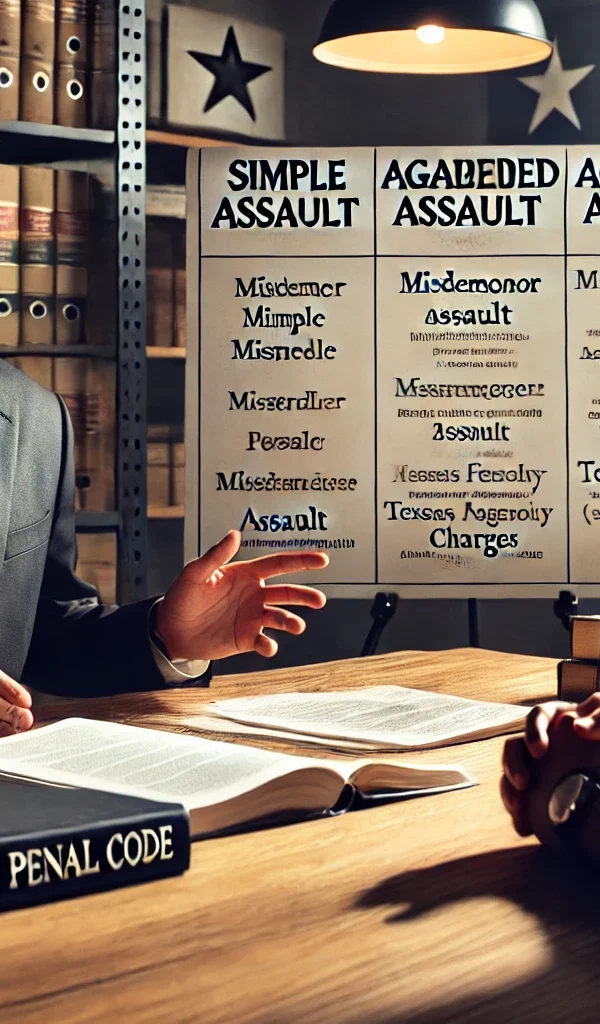Simple Assault vs. Aggravated Assault: Key Differences
If you or someone you care about has been arrested for assault in Harris or Galveston County, it’s critical to understand the difference between simple assault and aggravated assault under Texas law. The terminology might sound similar—but the legal consequences are vastly different.
In this post, we’ll break down:
-
The legal definitions of simple and aggravated assault
-
How these charges are classified (Class C, Class A, or felony)
-
Real-world examples
-
The penalties you could face
-
Why you need a lawyer near you immediately
Understanding the distinction could mean the difference between a minor fine and 20 years behind bars.
Legal Definitions Under Texas Law
Texas Penal Code §22.01 and §22.02 cover assault charges. Here’s how they divide:
Simple Assault (§22.01)
A person commits simple assault if they:
-
Intentionally, knowingly, or recklessly cause bodily injury to another person;
-
Intentionally or knowingly threaten another with imminent bodily injury;
-
Intentionally or knowingly cause offensive or provocative physical contact with another.
Aggravated Assault (§22.02)
A person commits aggravated assault if they:
-
Cause serious bodily injury to another, or
-
Use or exhibit a deadly weapon during the commission of the assault.
So, if an injury is more than just “bodily” and becomes “serious bodily injury,” or if a weapon is involved—even if it’s not used—you’re likely looking at an aggravated assault charge.
Classification Breakdown: Misdemeanor vs. Felony Assault
Class C Misdemeanor (Simple Assault)
-
What it involves: Threats of harm or offensive contact
-
Examples:
-
Yelling, “I’m going to hit you!” during an argument
-
Shoving someone or poking their chest
-
-
Penalty: Fine of up to $500
-
No jail time, but still results in a criminal record
Class A Misdemeanor (Simple Assault)
-
What it involves: Causing bodily injury to someone (minor injuries)
-
Examples:
-
Slapping someone across the face
-
Punching someone and leaving a bruise
-
-
Penalty: Up to 1 year in county jail and a fine up to $4,000
Felony Assault (Aggravated Assault)
-
What it involves: Serious bodily injury or the use of a deadly weapon
-
Examples:
-
Stabbing someone
-
Hitting someone with a bat and breaking bones
-
Pointing a loaded gun at someone during an altercation
-
Second-Degree Felony (Standard Aggravated Assault)
-
Penalty: 2 to 20 years in prison, up to $10,000 fine
First-Degree Felony (Enhanced Aggravated Assault)
-
Applies if:
-
The victim is a public servant, security officer, or family member in a domestic violence case
-
The offense involves retaliation or repeated violence
-
-
Penalty: 5 to 99 years or life in prison, up to $10,000 fine
In Harris and Galveston Counties, aggravated assault charges are prosecuted aggressively and often carry long-term consequences.
Comparison Table: Simple vs. Aggravated Assault
| Feature | Simple Assault | Aggravated Assault |
|---|---|---|
| Injury Severity | Minor or no physical harm | Serious bodily injury |
| Weapon Involved | No | Yes (firearm, knife, bat, etc.) |
| Charge Level | Class C or A Misdemeanor | Second- or First-Degree Felony |
| Max Penalty | 1 year in jail, $4,000 fine | 5–99 years in prison, $10,000 fine |
| Record Impact | Criminal misdemeanor | Felony conviction with long-term consequences |
| Example | Shoving someone in a bar | Stabbing someone in a domestic argument |
What About Domestic Violence Cases?
If an assault occurs in the context of a domestic relationship (current or former spouse, dating partner, roommate, etc.), the charge may be enhanced—even if the injury is minor.
For Example:
-
Pushing a spouse during an argument → May start as Class A Misdemeanor
-
Using a weapon or causing serious injury → Elevated to Aggravated Assault (Felony)
If you’ve had a prior domestic violence conviction, the new charge may escalate to a third-degree felony, even without serious injury.
Legal Process in Harris and Galveston Counties
Whether you’re facing simple or aggravated assault, the legal journey typically involves:
-
Arrest and booking
-
First appearance and bond setting
-
Arraignment
-
Pre-trial motions and discovery
-
Plea deal or trial
-
Sentencing if convicted
The stakes are high at every stage—and having a criminal defense lawyer near you who understands the system can dramatically impact the outcome of your case.
How an Attorney Near You Can Help
Assault cases often hinge on a few key details:
-
Did the injury qualify as “serious”?
-
Was the object truly a deadly weapon?
-
Was there a credible threat of harm?
-
Was it self-defense?
A skilled lawyer near you can challenge the evidence, negotiate with prosecutors, and develop a defense that fits your specific situation.
At the Law Office of JL Carpenter, we’ve handled everything from minor bar fights to felony aggravated assaults in both Harris and Galveston Counties. As a former felony prosecutor, JL knows how to spot weak points in the state’s case and fight for reduced or dismissed charges.
Final Thoughts
While simple assault and aggravated assault may sound like two sides of the same coin, the legal consequences couldn’t be more different. A Class C misdemeanor might result in a fine. A first-degree felony could cost you decades of freedom.
If you’re charged with any form of assault in Texas, don’t wait. Every minute matters.
Call the Law Office of JL Carpenter at (713) 201-6767 or visit https://jlcarpenterlaw.com/contact/ to speak with a trusted lawyer near you who will protect your rights and fight for your future.
